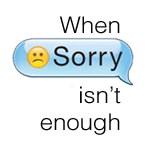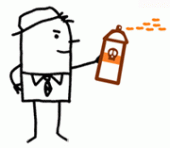 Master therapist (and co-founder of the Couples Institute) Ellyn Bader notes that several myths can render an apology meaningless and even useless. After debunking these myths, she offers a path for repair that is more effective than a glib or quick apology.
Master therapist (and co-founder of the Couples Institute) Ellyn Bader notes that several myths can render an apology meaningless and even useless. After debunking these myths, she offers a path for repair that is more effective than a glib or quick apology.
When a Loved One Commits Suicide (Resources)
 Tragically, several of my clients have had to confront the suicide of a loved one, or find themselves in the position of wanting to support someone who has experienced such a loss. The following list of resources focuses on supporting adolescents and young adults, but is relevant for a wider population as well.
Tragically, several of my clients have had to confront the suicide of a loved one, or find themselves in the position of wanting to support someone who has experienced such a loss. The following list of resources focuses on supporting adolescents and young adults, but is relevant for a wider population as well.
Teach People How to Treat You
 To a large degree (although not across the board or in every circumstance), we have much greater power to control how people treat us than we are aware. Often from fear of appearing selfish, unkind, or losing connection, we allow ourselves to be disrespected, and in so doing, start to lose pieces of ourselves.
To a large degree (although not across the board or in every circumstance), we have much greater power to control how people treat us than we are aware. Often from fear of appearing selfish, unkind, or losing connection, we allow ourselves to be disrespected, and in so doing, start to lose pieces of ourselves.
How to Ask for What You Want
 Working with couples, it strikes me over and over how instinctively partners move to the aggressive or passive/ avoidant end of the communication spectrum.
Working with couples, it strikes me over and over how instinctively partners move to the aggressive or passive/ avoidant end of the communication spectrum.
The former approach entails a readiness to attack, confront, criticize, or cast aspersion, and quickly escalates a conflictual exchange that could be so much more easily resolved. The latter promotes a sense of powerlessness in the relationship, self-pity and self-victimization, sulking, withdrawal, internalized and growing resentment, and does little to move a situation or dynamic in new directions.
Autism and Family Relationships (K. Doheny)
 There is ripple effect in a family with an autistic child, an astronomical one in terms of family dynamics. Dr. Cecelia McCarton, founder of The McCarton School and Center for Developmental Pediatrics in New York notes that family members — parents, siblings, grandparents, and extended family members, are all affected by a child’s autism.
There is ripple effect in a family with an autistic child, an astronomical one in terms of family dynamics. Dr. Cecelia McCarton, founder of The McCarton School and Center for Developmental Pediatrics in New York notes that family members — parents, siblings, grandparents, and extended family members, are all affected by a child’s autism.
Compassion for Intimacy (B. Atkinson)
 Brain science supports anecdotal evidence that compassion is infinitely more effective in de-escalating conflict and nurturing intimacy than are cool logic and rational argument. The following tactics are generally less than successful in trying to get the understanding and caring we need from our partner:
Brain science supports anecdotal evidence that compassion is infinitely more effective in de-escalating conflict and nurturing intimacy than are cool logic and rational argument. The following tactics are generally less than successful in trying to get the understanding and caring we need from our partner:
How to Handle Toxic People (K. Schreiber)
 Many of us have been challenged by toxic people in our lives who spew negativity, leaving us feeling somehow demeaned and deflated. From the Latin word toxikon, meaning “arrow poison,” the term toxic means literally: to fill or poison in a targeted way, says Theo Veldsman, head of Industrial Psychology and People Management at the University of Johannesburg.
Many of us have been challenged by toxic people in our lives who spew negativity, leaving us feeling somehow demeaned and deflated. From the Latin word toxikon, meaning “arrow poison,” the term toxic means literally: to fill or poison in a targeted way, says Theo Veldsman, head of Industrial Psychology and People Management at the University of Johannesburg.
Understanding Addiction (G. Maté)
 Unlike other treatment professionals, Canadian physician and social critic Gabor Maté disagrees with the current biomedical, genetic model of addiction. He insists that addictive patterns of behavior are rooted in the alienation and emotional suffering that are inseparable from Western capitalist cultures, which (by favoring striving and acquiring over noticing and caring for one another), end up shortchanging — and too often traumatizing — children and families.
Unlike other treatment professionals, Canadian physician and social critic Gabor Maté disagrees with the current biomedical, genetic model of addiction. He insists that addictive patterns of behavior are rooted in the alienation and emotional suffering that are inseparable from Western capitalist cultures, which (by favoring striving and acquiring over noticing and caring for one another), end up shortchanging — and too often traumatizing — children and families.